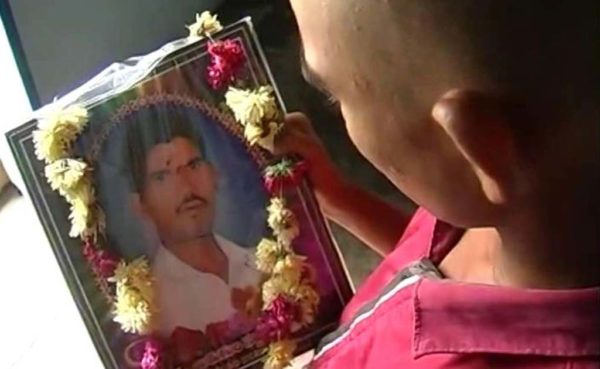In the month of August, absolutely nothing seemed to be going right for Burugula Satyam Rao, called “Sattaiah” by friends. The monsoon didn’t deliver and for the third year in a row, the maize and cotton he had planted on his small farm in Telangana were dead- the maize was stunted, the cotton saplings wilted away.
Debt for the 42-year-old farmer had crossed five lakhs. But what broke Sattaiah’s heart and spirit was that his son, Raja Shekar, was not allowed to give his exam because the family couldn’t pay his school fee.
“I told my daddy that the school is asking to pay fees. He said he would come to school that day. I went to school, there was an exam, but the principal did not permit me to write the exam,” said Raja Shekar.
The 16-year-old phoned his father for help. Sattaiah met the principal and was told that he must pay up by the next day. Two hours later, he killed himself by drinking pesticide.
In the last five weeks alone, 75 farmers have killed themselves in Telangana, unable to withstand the battering of drought for three consecutive years. Sattaiah is among them.
Raja Shekar’s mother Padma told NDTV that just a month earlier, Sattaiah was optimistic about the monsoon’s potential, and met his son’s teachers to urge them to work hard on his education. He told them he would pay the entire year’s fee at one go after the crop was harvested.
Hours before he died, he visited his farm, and returned home in tears, said Padma, who later discovered his body. “He used to say that we have only one son, whatever hardship we have to go through, we need to get him educated. But the crop failed,” she said.
Sattaiah was so determined that his son be spared the vagaries of weather that a farmer is subjected to that he put him in a private English-medium school that cost Rs 22,000 a year. The school bus cost an additional Rs 6,000. Raja Shekar, his father imagined, would be an engineer someday.
His family is entitled to Rs 6 lakh as compensation for his death but first it must go through a lengthy and cumbersome verification process by a 3-member committee of government officials who will decide whether Sattaiah’s was a “genuine” suicide triggered by farm distress and agricultural loans.
So far, there has been no enquiry. The son has not returned to school. His widow must deal, not only with her tremendous loss, but also with the debt that has crushed the life out of her family.






Leave a reply